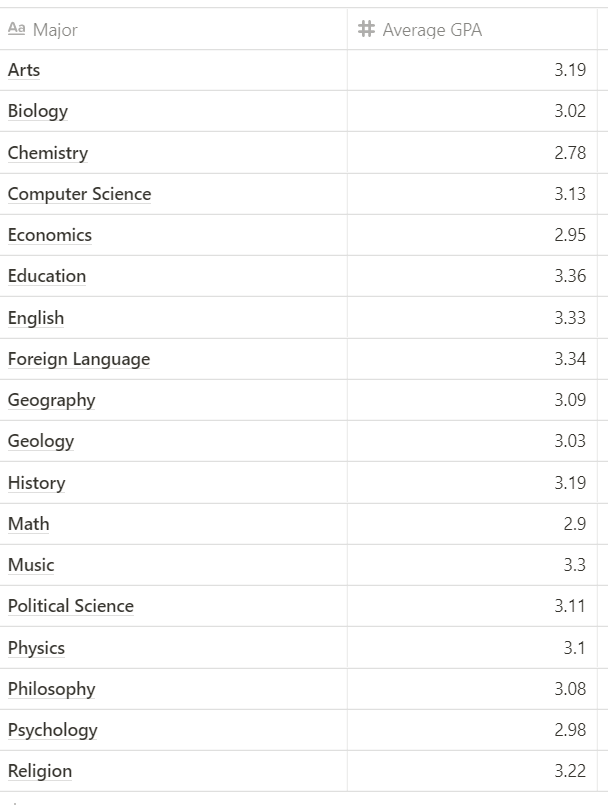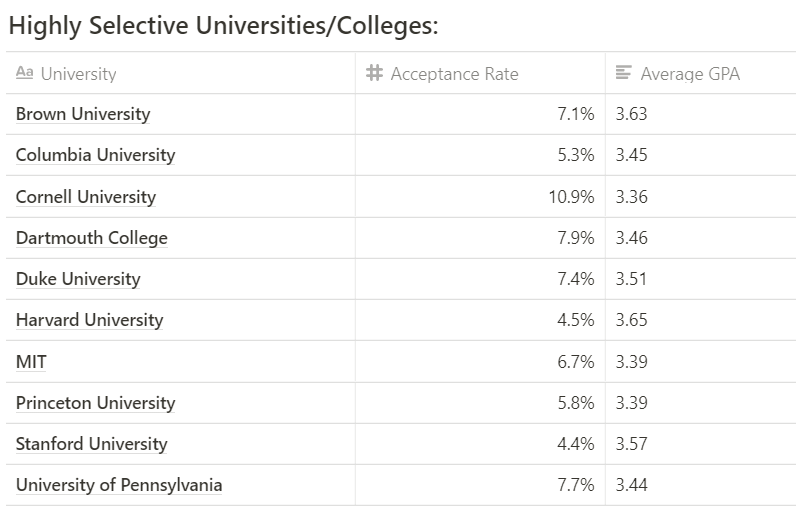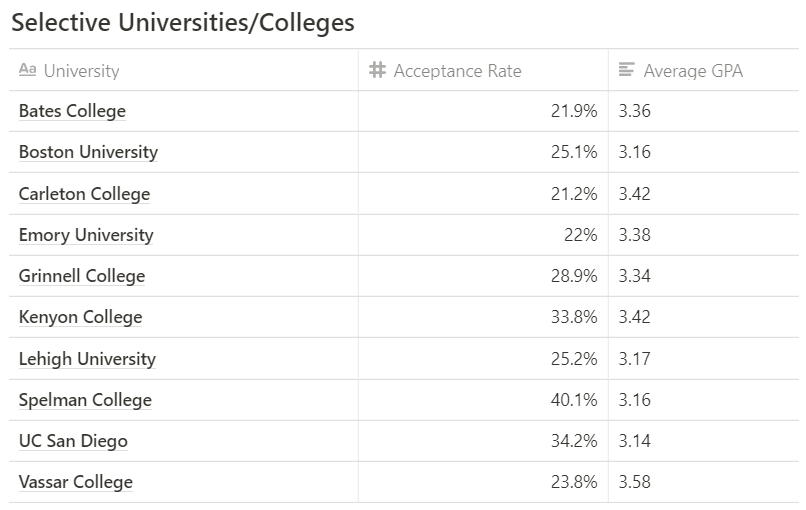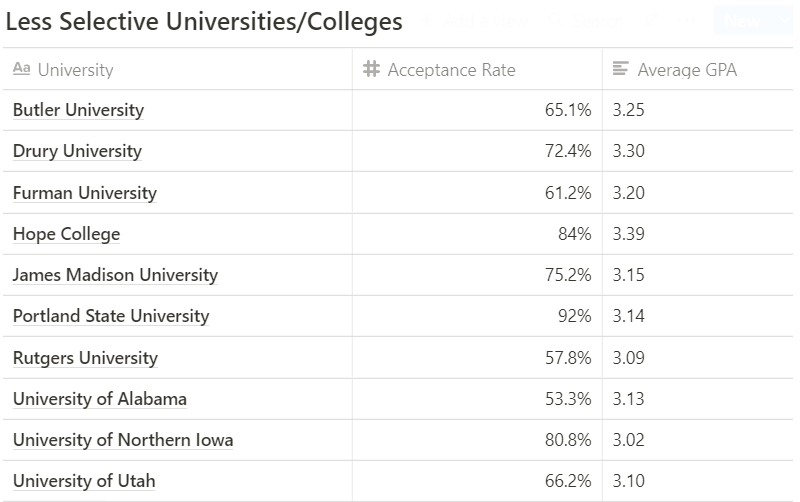Whether you are applying for university, or are already a university student, you are probably familiar with the term, GPA, which stands for Grade Point Average.
Or, if you are still in high school, you might be curious about how college/ university GPAs work, what is considered a good GPA and what you can expect for grades given your major of choice.
So what is a Good GPA?
Just like high schools, colleges vary in how they calculate GPA. Most of us are familiar with how our results are converted into GPAs, and typically, with a GPA of 4.0 being the highest possible grade.
Some countries do not follow the GPA grading system. For example, UK universities. Students’ grades are classified under 5 categories, namely:
- First class honours (1st)
- Second class honours, upper division (2:1)
- Second class honours, lower division (2:2)
- Third class honours (3rd)
- Ordinary degree (pass)
Average College/ University GPA + Comparison By Majors & Universities
The average GPA of students over ones’ 4 years of university education is typically 3.0 to 3.15. This number is much higher as compared to in the past due to this phenomenon known as: Grade Inflation.
All university and college professor want their students to succeed, and do not want to jeopardize their students’ chances at grad school or career opportunities in the future.
Majority of the professors hence tend to be more lenient in marking students’ course works and give students higher GPAs. This is more applicable in university courses that are under the non-Science, Technology, Engineering, and Math, or those in the non-STEM field, so courses like Literature, Business, etc, as assignments and exams are more subjective and open to interpretation and there is no fixed answer.
There are definitely exceptions to this as well. For example, one of my relative is a university professor who teaches Engineering, and when I asked him about the way he gives students their grades, he said that he always give students higher grades than they actually got. In my interview with him, he also added:
“When I mark their exam papers, I will have a black or blue pen with me. If let’s say, the exam has a total of 100 marks, and getting anywhere below 50 marks is considered a fail. I would secretly correct the students’ answers in the MCQ section or Short Answers section such that they will pass. I believe that at the university level, students are pretty independent in their studies and work, and as young adults stepping into the working world soon, it must be a daunting task. Failing a course means that the student have to retake it and graduate later, and I do not want my students to be at such disadvantage. Hence, I would help them when I can.”
GPA Comparison by Majors and Universities
Below is a comparison of the GPAs across different majors, arranged in alphabetical order, and the data here is based on a study done by Dr. Kevin Rask in Cornell Univeristy, and published in a paper titled: Attrition in STEM Fields at a Liberal Arts College: The Importance of Grades Pre-Collegiate Preferences.

Comparison of GPAs across universities from Highly Selective, Selective, to Less Selective, and taking into account of their acceptance rate:



Does GPA Matter?
If you are planning to go straight into the working world, then GPAs will not play a very huge role in your job application process. Now, there is less and less focus on the academic profile of graduates, and the focus is being shifted to one’s experience in their field of study, as well as one’s performance during the job interview process.
I am in contact with a manager who is in charge of hiring university and college graduate students at his work place. In an interview with him, he said:
“I do not put emphasis on one’s GPA at university when I am hiring people. What’s the point in knowing how to study and memorize things when you can’t put your knowledge to use in real life? I will usually look at their interview performance or any additional experiences that will make them stand out from the other pool of applicants. For example, an internship experience is a good start. Their performance during the job’s probation period also plays a role in determining whether they will be hired or not. There are too many applicants with similar GPAs. I do not look at their GPA in their resume, I skip straight to the work experience portion. You have to remember, there are hundreds of applicants, all competing for the few job roles available, and I don’t have time to look through every resume carefully. I typically take 30 seconds on each resume and decide if the individual should be called in for an interview or not.”
However, if you are aiming for graduate school such as law or medical school, GPAs are important and form the foundation upon whether your application will be considered or not. Graduate schools are extremely competitive, and hence, making the grades first is crucial, as it shows the Admissions Team that you are capable of reaching their expectations, keeping up with their academic rigor, and are dedicated in your intended field of study.
How To Improve Your College /University GPA
If you are not satisfied with your GPA, you can actually retake the courses that you achieved a low grade in.
Although this does mean that you will be graduating a little later than the rest of your peers, but if GPA is important to you, for example, if you are aiming for graduate schools, retaking the course is a great way to improve your GPA as it serves as a second chance for you to redeem yourself.
Additionally, since you are already familiar with the course content, it is very likely that you will be able to do much better on the next exam, hence, giving your GPA a (much needed) boost.
Conclusion
Due to Grade Inflation, students are getting higher GPAs at colleges and universities as compared to a few years ago. But are GPAs the most important factor in determining your future? Most probably not.
The focus now is shifting towards one’s experiences instead of one’s academic strengths. Unless you are considering to enter graduate school, then GPAs are not very important.
Choose a major that you know that you will enjoy, as it is key in getting good GPAs. And of course, work hard! You can do it!
Recommended for You:
- What is the Highest GPA Ever, And How To Get It
- Is a 3.3 GPA Good? Colleges That Accept a 3.3 GPA
- Does GPA Matter in College, and How Can You Raise it Higher?
- GRE Vs MCAT | Top 15 Key Differences
- Is a 3.9 GPA Good? Colleges That Accept a 3.9 GPA
- Is a 4.3 GPA Good? Colleges That Accept a 4.3 GPA
- Is a 2.8 GPA Good? Colleges That Accept a 2.8 GPA
- GRE Vs MAT: Comparison and Conversion Guide

